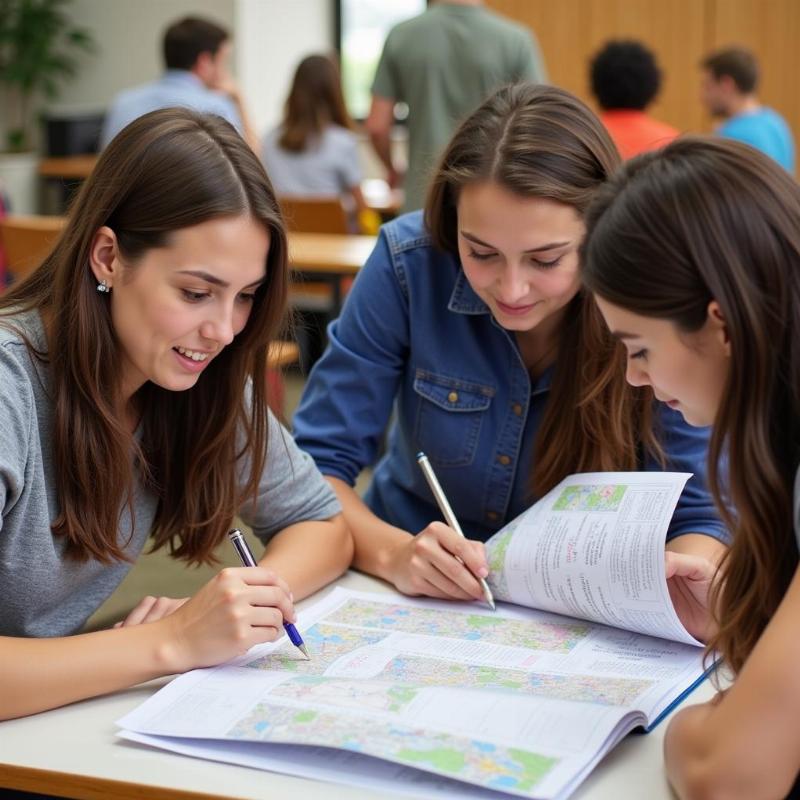Field trips are more than just a fun day out of the classroom. They serve a vital purpose in enriching education and fostering a deeper understanding of the world around us. From sparking curiosity to developing crucial life skills, the purpose of field trips extends far beyond the textbook. This article will delve into the multifaceted benefits of field trips, exploring their impact on students of all ages and highlighting how they contribute to holistic development.
Why are Field Trips Important? Experiential Learning at its Best
Field trips provide a unique opportunity for students to engage with the subject matter in a tangible and memorable way. Imagine learning about the solar system in a planetarium or witnessing the vibrant ecosystem of a rainforest firsthand. These experiences transform abstract concepts into real-world applications, making learning more meaningful and impactful. Field trips cater to different learning styles, offering kinesthetic learners a chance to move and explore while visual learners benefit from seeing concepts come to life. They also foster a sense of community and teamwork as students navigate new environments together.
The Educational Benefits of Stepping Outside the Classroom
Stepping outside the classroom walls breaks the monotony of traditional learning and exposes students to new perspectives. Field trips offer a unique platform for interdisciplinary learning, connecting classroom knowledge with practical applications in various fields. Whether it’s a visit to a historical site, a science museum, or a local business, these excursions create lasting memories and inspire a lifelong love of learning.
- Enhanced Understanding: Field trips connect theory with practice, making learning more concrete and relatable.
- Increased Engagement: Interactive exhibits and real-world scenarios captivate students’ attention and foster a deeper interest in the subject matter.
- Development of Critical Thinking: Analyzing real-world situations encourages critical thinking and problem-solving skills.
- Improved Social Skills: Working collaboratively in new environments promotes teamwork, communication, and social interaction.
Field Trips: More Than Just an Educational Excursion
Field trips are not solely confined to academic gains. They also play a significant role in personal development, equipping students with valuable life skills that extend beyond the classroom. Navigating unfamiliar environments, interacting with new people, and adapting to different situations fosters independence, adaptability, and a broader understanding of the world.
Developing Essential Life Skills Through Field Trip Experiences
The purpose of field trips goes beyond simply acquiring knowledge; they contribute significantly to shaping well-rounded individuals. By stepping outside their comfort zones, students develop essential life skills that prepare them for future success. These experiences nurture curiosity, resilience, and a greater appreciation for diverse cultures and perspectives.
- Increased Confidence: Successfully navigating new environments boosts self-esteem and encourages independence.
- Improved Communication Skills: Interacting with professionals and experts in various fields enhances communication and interpersonal skills.
- Cultural Awareness: Exposure to different cultures and communities broadens perspectives and fosters a sense of global citizenship.
- Career Exploration: Visiting workplaces and interacting with professionals provides insights into various career paths and sparks interest in different fields. outline the importance of field visit
Planning a Successful Field Trip: Maximizing the Learning Experience
Effective field trips require careful planning and execution to ensure a meaningful and engaging learning experience. From aligning with curriculum objectives to selecting appropriate destinations and incorporating pre- and post-trip activities, thoughtful preparation is essential for maximizing the educational impact.
 Teachers Planning a Field Trip
Teachers Planning a Field Trip
Key Considerations for an Enriching Field Trip
- Curriculum Alignment: Ensure the field trip aligns with learning objectives and reinforces classroom concepts.
- Destination Selection: Choose destinations that offer interactive exhibits and hands-on learning opportunities.
- Pre-Trip Activities: Prepare students with background information and activities to build anticipation and maximize engagement.
- Post-Trip Reflection: Encourage students to reflect on their experiences and connect them to classroom learning. nasa trip for students from india
Conclusion: The Enduring Value of Field Trips in Education
Field trips remain an invaluable component of a well-rounded education, offering students a unique opportunity to connect with the world beyond the classroom. From enhancing academic understanding to developing essential life skills, the purpose of field trips is multifaceted and far-reaching. By providing immersive and engaging experiences, field trips foster a lifelong love of learning and prepare students for future success. educational trip essay
FAQ:
- How can field trips enhance learning? Field trips provide hands-on experiences that make learning more engaging and memorable, bridging the gap between theory and practice.
- What are the benefits of field trips for students? Field trips offer a range of benefits, including enhanced understanding, increased engagement, development of critical thinking skills, and improved social skills.
- How can teachers plan a successful field trip? Careful planning is crucial for a successful field trip. This involves aligning the trip with curriculum objectives, selecting appropriate destinations, and incorporating pre- and post-trip activities.
- Why are field trips important for personal development? Field trips contribute to personal growth by fostering independence, adaptability, and cultural awareness.
- How do field trips help students develop life skills? By navigating unfamiliar environments and interacting with new people, students develop essential life skills such as communication, problem-solving, and teamwork. field trip meaning in marathi
- What is the long-term impact of field trips on students? Field trips can inspire a lifelong love of learning and equip students with valuable skills that contribute to future success.
- How can field trips connect classroom learning with real-world applications? Field trips provide real-world context for classroom concepts, making learning more relevant and meaningful. field trip meaning in telugu
PlaToVi, a leading travel company specializing in crafting unforgettable travel experiences, offers a wide array of services, from customized tour packages and hotel bookings to flight reservations and event planning. We are passionate about helping you explore the world and create lasting memories. Contact us today to start planning your next adventure! Email: [email protected], Phone: +91 22-2517-3581.